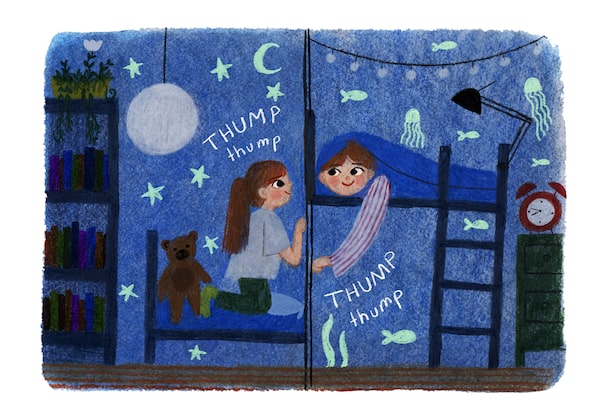First Person is a daily personal piece submitted by readers. Have a story to tell? See our guidelines at tgam.ca/essayguide.

Illustration by Chelsea O'Byrne
“I think I got my autism from you,” my first-born texted me one day.
The statement was random and caught me off guard. After a decade of masking at school, she was in burnout and looking for answers for why her adolescence weighed even more heavily upon her than her peers. But was she looking for someone to blame or connect with?
I had long wondered the same thing, so “Probably!” was my initial response. “Why do you think so?” I followed up a little later.
“Because you’re so weird,” came the inevitable reply.
She made me laugh. And she wasn’t wrong, although I had been trying to reframe weirdness as a cool thing for some time.
“I know! It’s what makes us interesting. I thought you didn’t want to be ‘basic’.”
(“Basic” was the new word for ordinary)
No response. I wasn’t interesting enough to hold her attention for long.
Diagnoses are tricky. They can clarify some aspects of ourselves and obscure others. Although I was fairly certain my daughter cycled through those same tormenting thought loops that had made life unbearable for my late brother, doctors refused to diagnose OCD. “It’s autism,” they said. “She doesn’t count.”
But neither had my brother. Maybe he “had” autism, too. As things got harder through COVID-19, I started to wonder if “counting” applied in more than one sense.
I think my little brother might have been autistic, looking back. But shyness was the word people often used back then.
“He’s just timid,” my mom would explain when her youngest child wrapped himself around her calves like a creeping vine at those huge family reunions each summer.
“She’s a bit backward,” my dad would mutter in embarrassment when I hid with my book behind a hay bale at those same compulsory gatherings. I didn’t know how to slide into that strange space of conversation in which my own contributions always seemed so forced and discordant. Silence was easier. Autism is a social communication disorder, after all.
As children, my brother and I slept in separate halves of a dismantled bunk bed on either side of a thin plaster wall. Sent off to sleep ahead of the older kids, we amused ourselves with tapping what we knew of Morse code on the wall: SOS SOS SOS SOS …
Sometimes we would beat out a rhythm to a nursery rhyme like Mary Had a Little Lamb (THUMPthumpTHUMPthumpTHUMPthumpTHUMP) that the other would have to guess.
After a while, my mother’s exasperated voice would ring out sharply from the living room: “Stop banging on the wall and go to sleep!” And the noise would subside for a while before a new, more complex rhythm game commenced, Simon Says style.
Sometimes, moved to mischief, I would scratch the wallpaper lightly with my fingernails, pretending I was the entity that severed children’s feet if they dangled over the edge of the bed in the terrifying story my best friend’s sister told. At that, my brother would grow alarmed and turn away from the wall, abandoning me to sleep and silence. (But we both slept with our feet tucked securely into the covers.)
Even in our waking hours a membrane of sorts always seemed to separate us, although we could communicate in our own peculiar way, thumping out codes or simply keeping each other company from the other side of the divide. We knew then that neither of us was neurotypical but lacked the language and the diagnoses to identify our shared eccentricity as anything more than awkwardness.
Back then, if you got by, there was no need to look closely at your neurotype. We blended in with the general population. As we grew older, we wore our masks dutifully if we had enough self-awareness to recognize our differences.
I’m not sure I had that same self-awareness. When I shook the school portable with my restless legs while writing out a story in grade school, I didn’t see that as stimming (shorthand for “self-stimulating behaviour”). But when I caught myself rocking with desperation beside my child as she lay sobbing on the floor one day, I started to wonder.
“I get it,” I said. “We’ll be neurospicy together.”
She took a break from her sobbing for disdain. “That’s so cringe.”
(“Cringe” is the new word for “embarrassing.”)
Maybe my daughter did get “her autism” from me (she always referred to her diagnosis as something she “had,” like an object she carried around with her, like the handbag featured in critiques of “person first” disability language). Or maybe it came from the uncle she never knew.
Doctors always ask for a family history. I had done so many intakes by now that talking about my brother became almost easy (I’m lying). But surely those old diagnoses were relevant, even if, as I now began to suspect, many had been missed.
Still, I wasn’t sure how I fit within any of this. What difference would testing for autism – as my daughter seemed to encourage – make anyway? I already had the ADHD diagnosis, autism’s more socially acceptable, more readily minimizable neurodevelopmental cousin. How in the world would spending more time exploring another diagnosis, my diagnosis, help my child? Sometimes our diagnoses aren’t just about ourselves.
“You can’t be autistic.” My daughter texted me on a different day. “You would get how hard this is if you were.”
I was trying. But maybe she was right. There was so much uncertainty. Sometimes our diagnoses can offer insights into those people we have lost. But sometimes they can make us lose sight of our differences. It could be that her question had set off a thought spiral of my own. It could be that I was still just straining to hear that soft thumping on the other side of the wall.
Kelly McGuire lives in Peterborough, Ont.